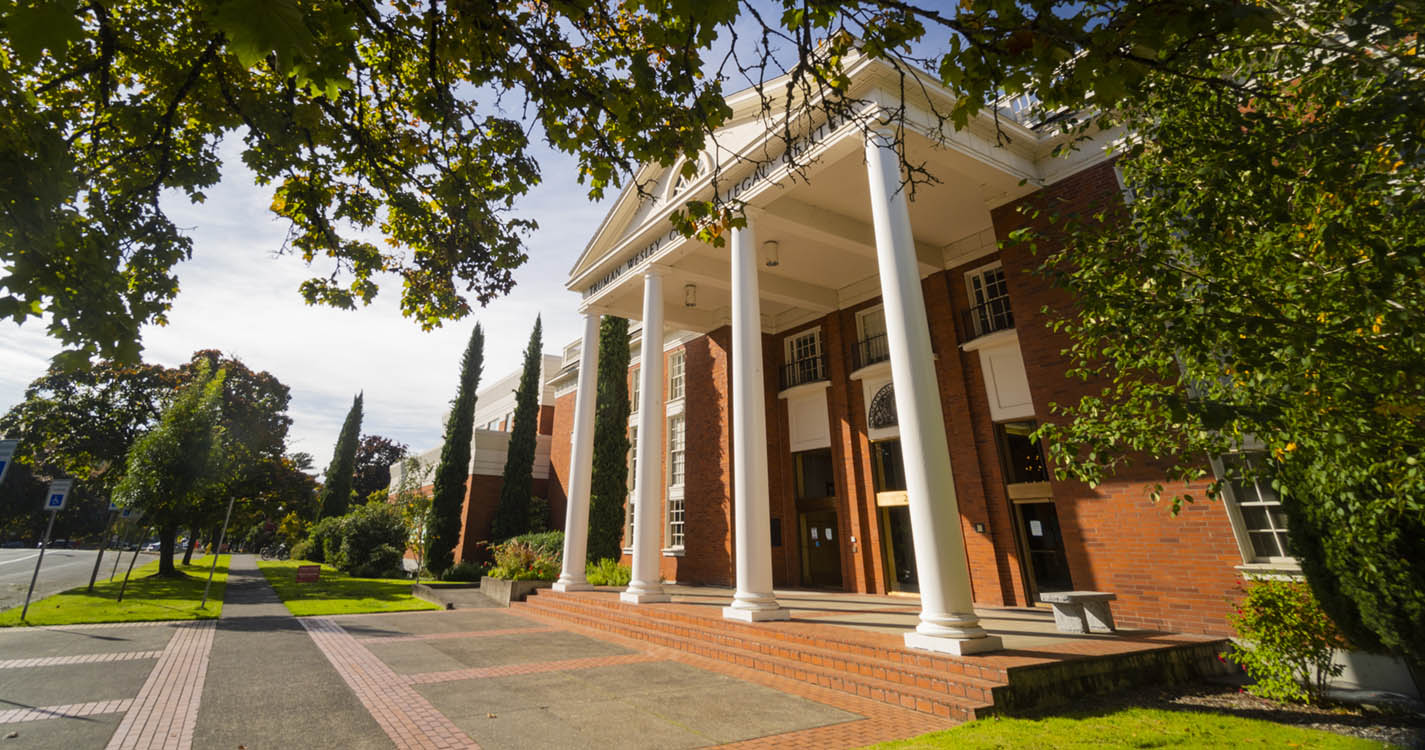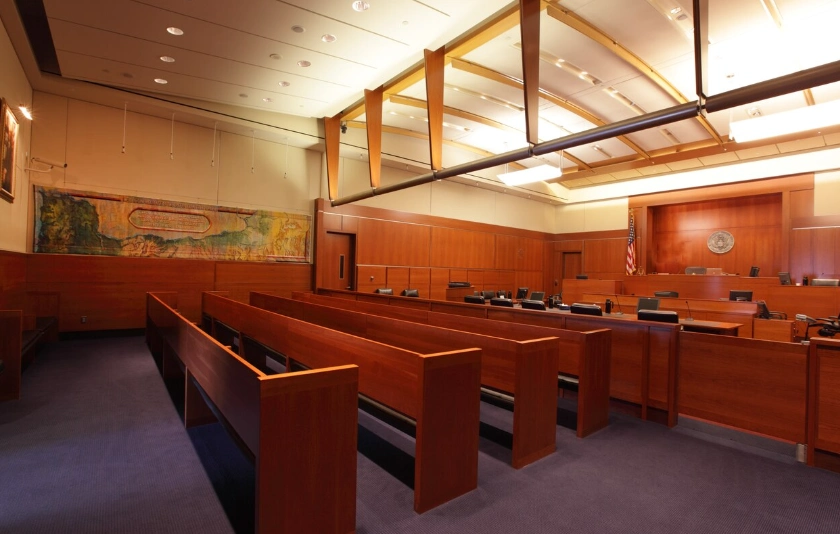Willamette Law is pleased to announce the Signature Strengths Initiative in keeping with its historically progressive approach to legal education.
The College of Law is excited to launch its Signature Strengths Initiative. As the first law school in the Pacific Northwest, the College prides itself in producing the best problem-solvers, community leaders and changemakers in the most innovative region of the country. In keeping with its historically progressive approach to legal education, the Signature Strengths Initiative is designed to highlight the College’s unique community-focused and student-centric approach to legal education.
The College of Law has historically delivered exceptionally strong bar passage rates and employment outcomes for its graduates. Fundamental to achieving those outcomes has been the faculty and staff’s one-to-one commitment to help all students succeed. Students know that, by coming to Willamette, they will get the support they need to pass the bar and get a job, but the Signature Strengths Initiative ensures that Willamette students also have the curricular freedom to pursue their passion. Moreover, identifying and investing in the College’s Signature Strengths holistically and inclusively highlights the College’s world-renowned faculty’s teaching and scholarly expertise across five core areas: Business Law, Public Service, Advocacy, International Law and Health Law.
Business law
Willamette Law’s approach to business law is unique: we train our students to be leaders in the business world. With several pathways for students to learn about business law and establish connections with the Oregon law and business community, our students get to practice what we teach before they leave school. Students can choose to (1) take business classes that are particularly relevant to their unique needs, (2) specialize in business law through obtaining a Certificate in Business Law — a pathway established to ensure our students gain the knowledge and skillset to be helpful to clients/colleagues on day one of their transactional or corporate practice, (3) work with real business law clients through the College’s Business Law Clinic, and/or (4) opt to pursue an MBA alongside their JD through Willamette’s Atkinson Graduate School of Management.
Beyond these interconnected pathways in business law, all students benefit from the Business Lawyering Institute at Willamette. A recent addition to an already-strong business curriculum, the BLI brings together some of our region's leading experts in business lawyering to provide students with access to additional experiential classes, workshop opportunities and networking events.
“As a teacher, I am most excited that Willamette is looking toward the future practice of business lawyers. We are focused on developing our students’ integrated legal and interdisciplinary understanding of the relationship between the law and business, including the ability to identify and respond to contextual considerations and demands of business clients,” says Professor Karen Sandrik, co-director of the BLI.
“This is the value that WUCL lawyers bring to business clients that AI cannot replace — the ability to understand both the existing and evolving nature of business clients so we can help these clients navigate the changes and emerging opportunities they face.”
Students can also choose to be a part of the student-led Business Law Society. The BLS was formed initially, and is maintained year-to-year, by students interested in business law. The students bring in guest speakers and host networking events with local lawyers and business professionals.
The College's approach to business law — that we train lawyers to be leaders in the business world — is grounded in our commitment to practical business lawyering training and dispute resolution. The College’s Center for Dispute Resolution has long been recognized nationally as one of the finest training grounds in dispute resolution. Offering students the opportunity to practice simulated business negotiations and learn in small-size workshops on particular topics involving real-life, regional deals and dealmaking, the Center for Dispute Resolution works collaboratively with the BLI.
No matter what pathway Willamette law students travel, we provide the ideal setting for students who are interested in business to practice what they are learning in the classroom.
Public service
The College's location in Oregon's state capital means that students can observe and participate in the many significant functions of state and county government, including the Oregon Supreme Court, the Oregon legislature and other state government offices. Many of our students have experienced unique public service opportunities through judicial clerkships and externships with state prosecutors and defense attorneys, the Oregon Department of Justice and various state agencies.
“At Willamette, our students are not just near the hub of government, policy-making and courts,” says Professor David Friedman, “they are immersed in it every day, and not just in the classroom.”
Moreover, the faculty has tremendous expertise in the areas of criminal justice, sentencing, state and local government, public health, the Bill of Rights, state constitutional law and employment law. The College also supports two other Centers -- the Center for Constitutional Government and the Center for Religion, Law and Democracy -- while offering students the opportunity to participate in the Law and Government certificate program. These collective opportunities underscore the College’s service-oriented mindset alongside its goal to produce the next generation of problem-solving lawyers.
Advocacy
Advocacy at Willamette Law involves preparing students to practice law in the real world to advance their clients' interests both in and out of court. The College of Law offers several courses to help students learn the legal profession's practical skills. This training can range from learning how to set up a law practice, to alternative dispute resolution and business negotiations, to criminal law and procedure.
Many of these courses are taught by active judges and retired state supreme court justices, providing students with the opportunity to make connections and learn from experts in the legal field. Students can also develop foundational skills in simulation-based courses where they can practice their skills before applying them at work.
“Effective advocacy requires knowing the law and knowing how to advance your client's interests,” says Professor Keith Cunningham-Parmeter. “At Willamette, we help law students build these skills through coursework, skills development and applied learning.”
Other opportunities to make connections and get real-world experience include participating in externships in a variety of settings, both domestically and abroad. In the past five years alone, the College has fostered a remarkable 126% increase in student externship opportunities.
International law
Willamette Law boasts a long and strong tradition of preparing students for the global practice of law. Our rich international law curriculum spans courses in both public and private international law, as well as comparative (foreign) law. The combined experience of our internationally recognized faculty remarkably encompasses nearly 200 years. Among the available courses are international law and dispute resolution, international business transactions, foreign relations law, international arbitration and litigation, immigration and refugee law, global sustainability, maritime law and comparative law.
“Willamette's comprehensive and nationally recognized program of international law provides a springboard for professional success,” says Professor James Nafziger, director of International Law Programs.
The JD, LLM in Transnational Law and MLS programs offer additional opportunities for students, including the student-edited Willamette Journal of International Law and Dispute Resolution, a certificate program in international and comparative law, and the international law moot court competition.
Health law
Nearly every aspect of our lives involves health law, and at Willamette, students interested in pursuing health law have a unique opportunity to learn from the best. The health law faculty is composed of experts with decades of experience actively contributing to scholarship and working in this rapidly evolving field. The scholars teach both public and private aspects of health law. They are currently helping develop the University's Public Health Ethics Advocacy and Leadership undergraduate major, as well as a new health law certificate program. This fall, a new course was taught on the legal implications of COVID-19.
“The COVID-19 pandemic has demonstrated just how essential an understanding of public health law is to our most pressing societal problems,” says Professor Paul Diller. “Combined with WUCL's strong curriculum in state constitutional, local government and administrative law, students at Willamette have the opportunity to study public health law with an understanding that states, cities and counties are usually the first movers in public health regulation.”
Willamette Law welcomes undergraduate students who take law classes as part of their studies. This integrated approach to curricula across schools is part of Willamette's approach in increasing access and cooperation among programs. The college provides opportunities for students to build their foundational knowledge in regulatory law, administrative law, medical malpractice and constitutional law, legal areas that have a significant impact on health law.
“At Willamette Law, students can expect an ‘Only at Willamette’ education, tailored to their unique interests,” notes Dean Brian Gallini. “Our personalized environment, combined with our Signature Strengths, helps orient our incoming students while providing them an opportunity to explore programs leading to academic achievement and a rewarding career.”
The Signature Strengths include focus areas and opportunities for applied learning with simulated courses, externships, certificate programs, law clinics and academic centers on campus. They are complemented by top-notch faculty, which includes seasoned practitioners and scholars, as well as current and former Oregon Supreme Court justices.
When combined with Willamette Law’s high bar passage and consistent graduate employment rates, the Signature Strengths Initiative collectively makes the College of Law a dynamic force with one of the most forward-thinking, creative programs in the country. And our graduates are the best testament to what is unique about a Willamette Law education, providing leadership, solving problems and having a positive impact on their communities.
“Justice, fairness and equality are at the heart of everything we do,” Gallini says. “We want our students to make a difference in society, and with our new emphasis on our Signature Strengths, we invite students to join us in that mission here at Willamette Law.”





